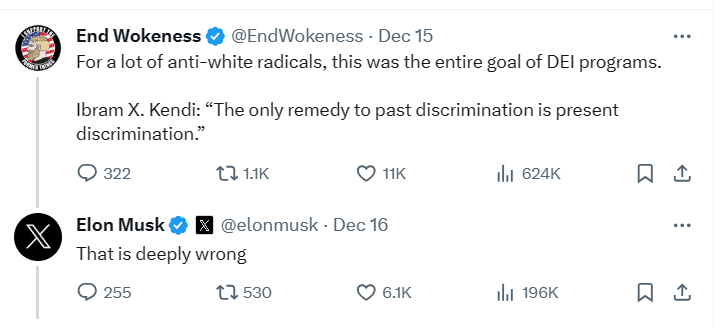DEI must DIE---the Woke virus! Why Elon Musk and Vivek Ramaswamy alerting US and Europe about this virus?
In his run for the President of the USA, Republican Vivek Ramaswamy (US citizen of Asian origin and a Billionaire Businessman) has been talking at a lot of corrections that US needs to do to save its principal identity as a nation of free speech, equal rights, merit and civic commitments-based immigration, military protecting its borders, where illegal immigrants are coming from, against crony capitalism, et al.
What he is equally vocal about is the Woke politics and the deeper roots this virus has taken in American capitalism/ corporate.
Vivek has written a book on this Woke virus. Woke, Inc.: A Sunday Times Business Book of the Year eBook : Ramaswamy, Vivek: Amazon.in: Kindle Store
A few days back Elon Musk in an interview in Italy said what is quoted in the tweet below-
"In my view, it (DEI) amplifies racism, sexism, and all the other isms. And while claiming to do the opposite, it actually divides people and makes them sort of hate each other, and it makes people hate themselves.” Elon Musk.
Why are Elon Musk and Vivek Ramaswamy alerting the US and Europe about this virus?
We have already seen runs on the CDO positions at Nike, Tesla, Warner Bros., Netflix, Zoom, Pinterest, etc. in the past two years. Many of these CDOs had fun for as little as 5 months or less!
So, when Elon and Vivek warn countries of the DEI (aka Woke culture) and its sinister agenda to fragment people based on hardcoded woke principles, which rather than rendering hope and liberation from discrimination, creates fear, hatred for others, and even self-hatred, as Musk said!
In India too, we have seen this DEI rush for almost a decade. It all began as More Women for Men in corporate positions, including equity in boards too!
Xpheno's report some years ago cited that, in 18 months of time, it observed that more than 50% of CHRO positions in India that were vacated by men went to women candidates (not employees).
I believe it is a fair time after a decade to examine and take stock of what DEI has delivered against its promise (now called Woke Virus and Agenda by people like Elon Musk and Vivek Ramaswamy, which, however, you can ignore at your own risk!).
Let's fact-check:
How many of Indian companies or Indian subsidiary of MNCs have:
Mention specifically the non-binary genders in their employee policies and hiring programs from campus or the market.
How many have mentioned insurance and child adoption benefits for same-sex couples?
How many have gender-neutral (they/them?) washrooms at the office?
-How many have paid benefits for Gender Affirmation surgery to staff? (Accenture India has it; name the companies that you know of.)
How many companies here have OPEN-Gay staff for giving them the freedom to be themselves to others around them in the workplace?
How many of you heard in your company's annual hiring or promotion announcements about diversity-specific hiring or promotion decisions on specific "identities" of the diversity group?
Most importantly, how many of you went through the company's "mandatory" training on DEI this year?
I am not against DEI; I am against Woke culture and identity politics that are done in the name of DEI!
If a virus-free DEI has to emerge, this DEI that we see around must DIE!
Thanks, Musk and Vivek for calling out the agenda!
Vivek Ramaswamy on Unpacking the 'Woke" Phenomenon
The number of Chief Diversity Officers (CDOs) is declining after a hiring surge post-Black Lives Matter movement, raising concerns about the commitment of organizations to diversity, equity, and inclusion (DEI). Reasons for the decline include lack of support, resources, and commitment, and the disconnect between DEI efforts and profitability. Retaining CDOs requires reframing their role, providing long-term budgets and resources, and ensuring executive support.
The ‘Great DEI Resignation’ – why are so many diversity heads calling it quits? | TLNT
- Hiring boom for CDOs post-Black Lives Matter movement.
- Decline in CDO numbers, with a 4.5% decrease in 2022 according to a LinkedIn report.
-Who Are Chief Diversity Officers?
- Upper-level management responsible for a company's inclusion and equity initiatives.
- Tasks include recruiting diverse employees, identifying diversity gaps, organizing training, and addressing discrimination concerns.
- Typically hold advanced degrees and have 5-10 years of relevant experience.
- Reasons for CDO Departures:
- Lack of support, resources, and companywide commitment to DEI efforts.
- CDOs often undertake the work of multiple roles, leading to burnout.
- Superficial hires without empowerment to address systemic inequities.
- Financial concerns leading to elimination of DEI-related positions.
- Challenges Faced by CDOs:
- Discrimination within organizations against CDOs.
- Frustration and burnout due to obstacles in creating change.
- More Resources Are Needed:
- Reframing DEI as a profitable strategy.
- Peer support for CDOs and long-term budgets.
- Real change champions and visible executive support.
- Treating CDO positions with the same respect as other upper-management roles.
- Diversity Without a CDO:
- Companies risk losing momentum in DEI efforts and miss out on diverse talent.
- CDOs address unconscious bias and microaggressions, requiring long-term commitment.
- CDO presence affects a company's culture, bottom line, and appeal to diverse talent.
- Conclusion:
- Companies must view DEI efforts as ongoing and demonstrate a commitment beyond having a CDO in place.
- The risk of losing CDOs not only affects DEI progress but also impacts the company's culture and financial performance.
This comprehensive analysis highlights the challenges faced by CDOs, the reasons for their declining numbers, and the necessary steps organizations should take to retain them and ensure the success of their DEI efforts.
Were Chief Diversity Officers Set Up to Fail? Recent Exits Indicate This Could Be the Case | Visier
Key Takeaway
Chief Diversity Officers (CDOs) are facing burnout and a lack of executive support, leading to a significant number of them quitting their roles. The departure of CDOs, especially within S&P 500 companies, suggests challenges and inadequacies in supporting diversity, equity, and inclusion (DEI) efforts.
Summary
- Exodus of CDOs:
- A significant number of Chief Diversity Officers at S&P 500 companies left their positions between 2018 and 2021, with an average tenure decrease from 3.1 to 1.8 years in 2021.
- Notable instances include leaders leaving companies like Tesla and Nike due to burnout and lack of support.
- Root Causes of Departure:
- DEI programs were often implemented without proper consideration of how to run and measure a successful initiative.
- Unrealistic expectations, insufficient resources, and a lack of executive support contributed to the failure of DEI programs.
- Impact of George Floyd's Murder:
- The murder of George Floyd in 2020 prompted a surge in DEI-related job postings, with companies appointing diversity leaders for the first time.
- However, two years later, some programs are being discontinued, and CDOs are resigning.
- Reasons for DEI Program Failures:
- Lack of resources, executive support, and funding.
- Treating DEI programs as one-and-done processes instead of ongoing commitments.
- Pressure to meet numerical targets rather than focusing on the human aspect of equity and inclusion.
- Components of Successful DEI Initiatives:
1. Proper Funding:
- Adequate budgeting crucial for a successful DEI program.
- Costs can range from $25,000 to $450,000 for comprehensive DEI initiatives.
2. Clear Objectives:
- Establishing key performance indicators (KPIs) for measuring success.
- Aligning DEI programs with overall strategic plans.
3. Executive Buy-In:
- Executive support and resources are essential for DEI leaders.
- Promised support must be provided for successful DEI programs.
4. Diversity Planning Tools:
- Utilizing analytics for transparency in hiring practices, compensation, and other critical areas.
- Importance of Supporting DEI Leaders:
- Building a diverse, equitable, and inclusive organization is a business imperative.
- Organizations need to focus resources, including funding, on DEI programs and leaders for genuine success.
- People analytics and diversity planning tools can aid in tracking and communicating progress.
This report highlights the challenges faced by CDOs, the failure of some DEI programs, and emphasizes the need for proper support, resources, and strategic planning for successful diversity initiatives.



This comment has been removed by a blog administrator.
ReplyDelete